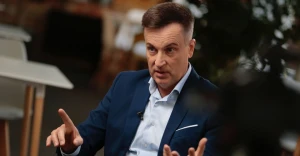
Sometimes our positions were left without food and water: eyewitness account by Hanna Kozachuk, medic and rifleman
Hanna joined the army last year. At first, she was a medic in Ukraine's volunteer army, and now she serves in the Armed Forces of Ukraine as a medic and rifleman
Espreso shares Hanna's story.
"I said I would be a driver, a medic, anything, only for them to accept me..."
Hanna Kozachuk with the call sign Pinochet felt the war back in 2014, when Russian forces first invaded Ukrainian territory. Back then, her husband and brother went to fight the Russian enemy. Hanna also wanted to join the army because she knew that medics were needed at the front. But her husband asked her to stay at home. So she started helping the army. And when she woke up to the explosions last year on 24 February, she didn't wait, she immediately got in her car and went to the army. She joined the Ukrainian volunteer army.
"I tried to go to the military registration and enlistment office. I was told that women were not needed," says Hanna Kozachuk. - "My brother was in the Hospitallers organization, so I went with him to the battalion. I have a medical degree, so I knew I would be useful. My brother was going to the base to join the Hospitallers and I went with him. I hoped they would accept me, I was very nervous, afraid, and wanted to offer everything I could. I said I'd be a driver, a medic, I'd be anything, just to be accepted."
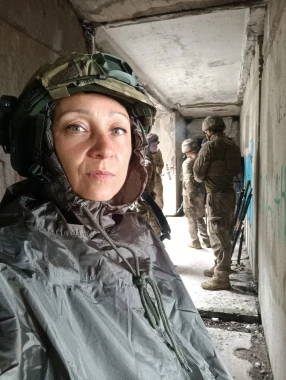
Photo: Hanna Kozachuk's archive
In civilian life, the woman was a physiotherapist and rehabilitation therapist. She was successful and wealthy. But after the start of the full-scale invasion, she left her comfortable life to save the military. During her time in the volunteer army, she worked at different stages of medical care: case manager, medical assistant and helped in the stabilisation centre. For the first time, she went to the war zone in the Donetsk region. Hanna admits that it was a lot of stress at the time. She hadn't thought about the lack of conditions and the sudden need to perform duties she hadn't yet had time to understand. That was when we had our first wounded and dead. One day, during an assault on the stabilisation point, there were almost two hundred wounded and twenty dead in two days. These were the most brutal days for Hanna, when she realised what war was.
"The wounded mostly behave the same way, they scream because it hurts so much. They ask if they will live, where their arm or leg is," says Hanna. - "There was one wounded man I will never forget. He was a 25-year-old blond guy. His leg was torn off. They taped it up as best they could to give the doctors a chance to do something. But this guy was silent. He was completely silent, just blinking his eyes, but not a single muscle moved in his face. He looked at nothing and was silent. I imagined how much it hurt. His leg was severed, quite high up. We twisted it, rewound it, put in drips, did everything, but he was silent."
The hardest part is at night, when you have to save the soldiers by feel
After some time in the volunteer battalion, Hanna decided to join the Armed Forces of Ukraine.
That's how she ended up in an infantry brigade, where she still serves. There, Hanna became a corpsman and a rifleman. Now she is constantly working in the field with the brigade, which means trenches and living in dugouts. She remembers the most difficult battles in the Bakhmut sector. Every time she was on a mission, there were several wounded at the same time.
"Every exit is a battle. There are always wounded in the trenches," emphasises Hanna. - "I go on missions with the guys all the time and am with them in combat. If someone is wounded, I have to run and help them. I have to save the life of that soldier in order to send him for evacuation, so that he can live to see the evacuation. Usually, if there are hits, there are 5 wounded at once. And they all fall on my head. Because the soldiers get lost and do not help any of their colleagues or themselves. So I need to quickly sort the wounded: those who are more injured, those who are less. I have to help the first ones and quickly send them to evacuation. It is very difficult because there are also night battles. You can't see anything at night and often you can't even switch on a flashlight. We have to do everything by feel. Most of our guys die from bleeding. Not because of the severity of the wounds, but because they bleed to death."
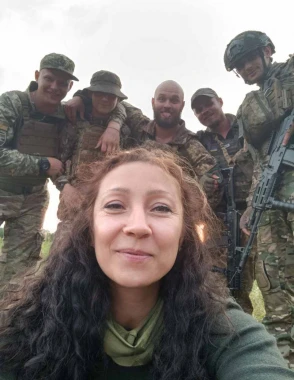
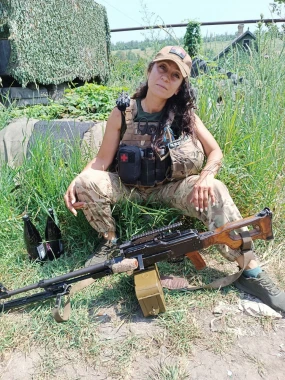
Photo: Hanna Kozachuk's archive
Every time she goes on a combat mission, Hanna carries a helmet, body armour, assault rifle, ammunition, food, water and a medical backpack. The luggage she carries weighs several dozen kilograms.
"We go to our positions at three or four in the morning," Hanna describes her day. - "A car brings us to the armoured vehicles. Then we drive to a place where nothing can go further. And then we have to go to the positions in the grey, almost dark, so that we are not seen by enemy eyes. Because copters cannot fly at night. We have to walk several kilometres. Sometimes we get to our positions when it is cold, and there is no way to dry off and warm up. Everyone is wet, but we all walk together."
After being wounded, she again saves soldiers on the front line
Often they have to work on the frontline under fire. Hanna Kozachuk says: sometimes you don't hear how they fire, but you hear how they hit. So you need to be prepared to fall and hide.
"We take up positions for 3-5 days. We had situations in winter when there was no water. We had to collect snow, if there was any, and icicles on the trees. This was the only thing we could drink. We were running out of food. But that was not the worst thing. The problem is when there is no water. There were times when we were without water and food for a day or two. Because we could not bring much. The guys took more battle sets, less food and ran out. Or they did not bring it. When we leave, first we carry the battle sets, then we return, and there is no water, because the neighbouring unit took it. And we were left without water. Armoured vehicles cannot go back and forth because it is noisy and dangerous. We try to minimise costs. Once we drive up, the vehicles return and we are all safe. The vehicles come back only when there are wounded."
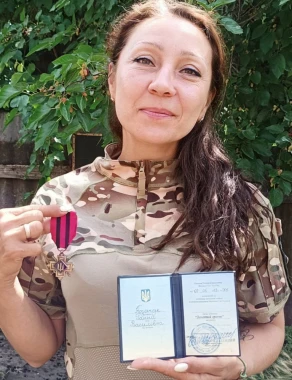
Photo: Hanna Kozachuk's archive
During one of these attacks in the Bakhmut sector, Hanna was wounded. It was during a 120mm mortar attack. One of the fragments went through her legs. She underwent rehabilitation and returned to the army. Now she is fighting alongside her brother in the army, and her parents and a seven-year-old boy she takes care of are waiting for her at home. But she is convinced that more are needed on the front line.
After being wounded, Hanna Kozachuk received the Golden Cross for successful combat missions from Commander-in-Chief Valerii Zaluzhnyi.
- News









